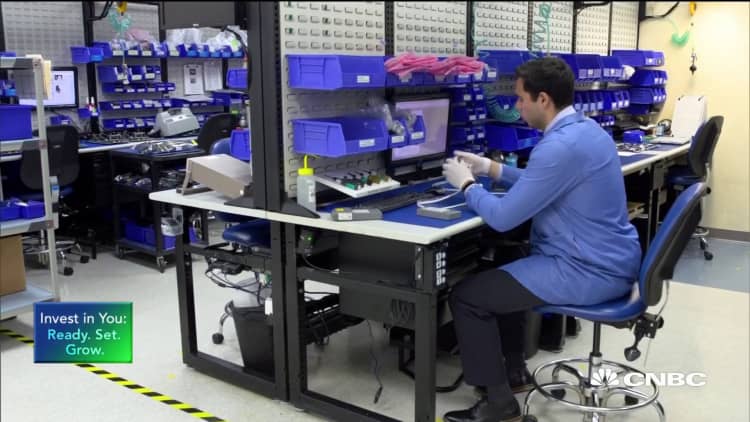Here's how to get rid of that knot in your stomach when you look at your outstanding student loans.
Melanie Lockert was panicking. Even after five years of making steady payments, Lockert was in her late 20s and still owed $68,000.
In January 2013, Lockert knew she had to get serious about her finances. She started a blog, Dear Debt, to give herself accountability. She wrote openly about her emotional state and tackled the debt head-on. At age 31, she had paid off three loans: two for her college degree and one for her master's. Her book about student debt was published in 2016.
More from Invest in You:
Living paycheck to paycheck? Here's how to save up $10,000
Avoid 6 financial mistakes when you teach kids about money
Try these surprising strategies to use up health flex spending
Student debt in the U.S. surpassed $1.6 trillion for the first time in the second quarter of 2019. It's a bipartisan issue, with plenty of solutions being floated.
A recently introduced bill from Sen. Rand Paul, R-Ky., would allow people to dip into their retirement plans to pay off student loans. Not a good idea, says Jeff Schneble, CEO of Human Interest, a San Francisco-based retirement plan provider.
"It's better to save at least something," Schneble said. In other words, find a way to save for retirement and stash cash for your emergency fund.

Lockert suggests getting creative about cutting corners. Try a training school or Groupon deals for discounted haircuts and other necessary services.
Side hustlers should try to get dual benefits: Lockert worked at events where she often got leftover food and wine in addition to her pay. "It lowered my food budget," she said.
Most important, know your spending triggers. When she's hungry or exhausted, Lockert says she'll spend any amount to feel better. Instead of dropping $20 on a croissant and coffee at the airport when she has an early morning flight, she arms herself with a granola bar and a banana.
Do listen to your feelings
Debt sparks strong emotions. Lockert suggests choosing the most upsetting debt and paying it off first. "If you have credit card debt from [times with an ex-boyfriend] or debt from a school where you had a bad experience," Lockert said, you might start there.
Don't just pay the minimum
Lockert says she made a big mistake, originally paying off her loans as an ordinary monthly bill. "If you want to get out of debt, you have to pay more," she said. "[The minimum] is just a rule but shouldn't be taken as a rule."
Under the standard repayment plan it would have taken her 10 years to pay off the debt. Instead, she did it in six.
Caveat for anyone thinking of applying for a loan forgiveness program: paying more than the minimum may affect your payment record and jeopardize your ability to have the loan forgiven.
Don't stay in the dark
"People don't necessarily know what their interest rates are," Lockert said. Her three loans for college and grad school each had different rates.
People often overlook the cost of the loan, and don't take the time to figure out how it affects them financially.
Lockert chose the debt avalanche method: paying down the highest-interest debt as quickly as possible. "For me this worked best, because knowing I was paying $11 a day in interest made me really angry," she said. "I felt I was flushing money down the toilet every month."
Put a reminder in your calendar for every due date of your loan.Melanie Lockertblogger
Pick the right payment plan
Some people like the satisfaction of the Dave Ramsey snowball method. You choose your smallest loan amount and throw resources at paying it off. "It's really about motivation," Lockert said. "If you feel unmotivated and you're not sticking with the avalanche method, consistency is key."
The right payment plan is the one you'll stick with, Lockert says.
Don't be late
If you're not consistently making monthly payments on time, that can lead to delinquency and additional interest.
"Put a reminder in your calendar for every due date of your loan," Lockert said. "Sign up for auto payments — you can get a 0.25% interest rate reduction."
The last thing you want to do is incur an overdraft and add another financial problem to your life.
Know your servicer
New graduates have a lot to learn when it comes to paying back their loans: where to make payments, who to contact for questions.
The loan servicer is the middleman between whoever lent you the money — the government or a private company — and you, the borrower.
The relationship may feel adversarial, but their job is to help you. "If you can't make payments, let them know your situation" Lockert said. "Let them know your situation and find out your options."
It's always a mistake not to reach out. Remember: You want to avoid defaulting on the loan.
SIGN UP: Money 101 is an 8-week learning course to financial freedom, delivered weekly to your inbox.
CHECK OUT: The unexpected reason you may not want to buy a new car, according to Consumer Reports data via Grow with Acorns+CNBC.
Disclosure: NBCUniversal and Comcast Ventures are investors in Acorns.





